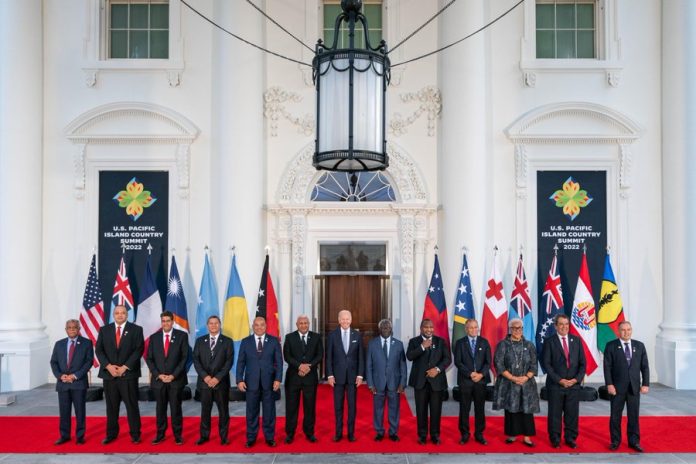With China’s threats being the bedrock of its revitalised interest in the Blue Pacific region, Washington has overlooked climate change as the most troubling concern for island countries, according to the Pacific Elders Voice (PEV).
Rendering their verdict on the U.S-Pacific Partnership Declaration recently sealed at the White House, the Pacific Elders were not too keen on its content,
While the declaration “outlined in broad terms and restored what existed in the past, reflecting a reevaluation of Pacific island countries’ relationship with the U.S,” PEV doubted it would entail any substantial outcome.
“We feel this was a lost opportunity to demonstrate more tangibly U.S commitment to climate action, recognise climate change as the single biggest security threat to the region and underscore the sense of urgency for climate actions,” PEV said in a statement.
While “tackling the climate crisis together” was listed in the declaration as a priority, the Pacific Elders said the funding aid pledged by the U.S leaves much to be desired.
“The overall funding announcement of an additional US$810 million over 10 years to 15 countries is inadequate to deal with the climate crisis facing the region,” they said.
The 11-point declaration was signed by President Biden and leaders of Pacific island countries, including Cook Islands, the Federated States of Micronesia, Fiji, French Polynesia, Nauru, New Caledonia, Palau, Papua New Guinea, Marshall Islands, Samoa, Solomon Islands, Tonga, Tuvalu and Vanuatu.
The declaration signing capped the U.S-Pacific Island Country Summit hosted by the White House from 28- 29 September.
“It appears that the declaration is a rebranding of existing partnerships including fisheries, compact funding (negotiations already undergoing with three PICs) but nothing new for the rest of the Pacific Islands Forum,” the Pacific Elders said.
“There are many statements of shallow aspiration on important issues such as peace, security, regionalism, resilience, economic growth, maritime, nuclear etc with little commitment to a specific action in the declaration,” the statement added.
The Pacific Elders noted that the summit was “largely a response to the evolving geopolitical dynamics in the Pacific region and the world generally” that pushed climate change into a mere footnote.
“Leading up to COP27, this could have been demonstrated through firm commitments on the part of the U.S, as the biggest emitter of greenhouse gases, in its nationally determined contribution on its reduction actions come 2030,” said PEV, which comprises former island leaders.
The group noted that “global emission reduction of at least 55 percent by 2030, below 2020 levels needs to be achieved in order to keep the Paris Agreement temperature target goal alive.”
Besides climate change, PEV reminded the U.S that the legacy of its nuclear testing in the Marshall Islands continues to be an ongoing point of contention.
“We urge the U.S to earnestly address this issue in the ongoing negotiations with the Marshall Islands,” PEV said.
The group also reminded the U.S of its yet-to-be-fulfilled proposed action on the safe removal and disposal of unexploded ordnance and WWII wrecks in the region.
PEV members include Hilda Heine, Tommy Remengesau and Anote Tong, former presidents of the Marshall Islands, Palau and Kiribati, respectively; Enele Sopoaga, former Tuvalu prime minister; Dame Meg Taylor, former secretary general of the Pacific Island Forum Secretariat; Robert Underwood, former Guam delegate to U.S Congress; Kaliopate Tavola, former Fiji minister; and Konai Helu Thaman, former professor at the University of the South Pacific.
SOURCE: PACIFIC ISLAND TIMES/PACNEWS













